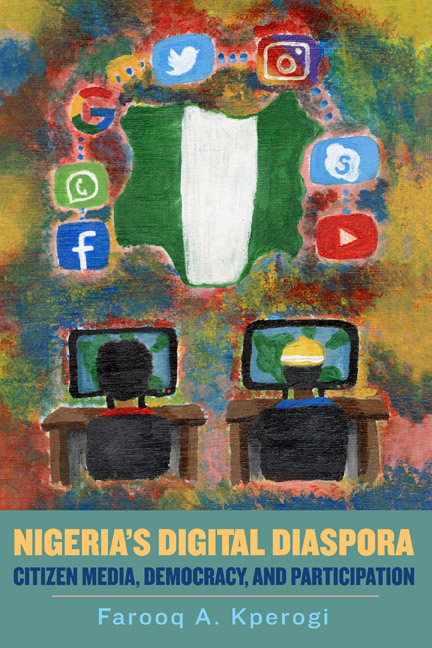Book contents
- Frontmatter
- Dedication
- Contents
- Acknowledgments
- Introduction
- 1 Citizen and Alternative Journalism: Mapping the Conceptual Contours
- 2 The Nigerian Press: From Colonial Evangelism to Guerrilla Journalism
- 3 The Nigerian Digital Diasporic Public Sphere
- 4 Profiles of Diasporic Citizen Media Sites
- 5 From the Diaspora to the Homeland: Role Reversal in News Flows
- 6 The Nigerian Government’s Response to the Diasporic Citizen Media
- 7 Domestic Online Media, Social Networked Journalism, and Participation
- 8 Mainstreaming of Diasporic Citizen Journalism and Implications for Nigerian Journalism
- Notes
- Bibliography
- Index
4 - Profiles of Diasporic Citizen Media Sites
Published online by Cambridge University Press: 13 April 2021
- Frontmatter
- Dedication
- Contents
- Acknowledgments
- Introduction
- 1 Citizen and Alternative Journalism: Mapping the Conceptual Contours
- 2 The Nigerian Press: From Colonial Evangelism to Guerrilla Journalism
- 3 The Nigerian Digital Diasporic Public Sphere
- 4 Profiles of Diasporic Citizen Media Sites
- 5 From the Diaspora to the Homeland: Role Reversal in News Flows
- 6 The Nigerian Government’s Response to the Diasporic Citizen Media
- 7 Domestic Online Media, Social Networked Journalism, and Participation
- 8 Mainstreaming of Diasporic Citizen Journalism and Implications for Nigerian Journalism
- Notes
- Bibliography
- Index
Summary
The upsurge of diasporic Nigerian citizen journalism in the United States in the mid-2000s is almost coextensive with the mass migration of Nigeria's print newspapers to the Internet. On the surface, this development seems incongruous, even counterintuitive. The migration of news content from homeland legacy newspapers to the Internet, which frees it from the constraints of time and space, should have satisfied the yearning for domestic news by diasporic Nigerians in the United States and therefore obviated the need for the emergence of diasporic news outlets that publish news about the homeland. Nevertheless, diasporic citizen news outlets not only compete with but also vigorously undermine the credibility of homeland newspapers. As this and the next chapter will show, two fundamental factors account for this situation.
The first reason, as chapter 3 hinted, is the dearth—in fact, the outright death—of the brand of investigative and advocacy journalism that characterized the anticolonial and antimilitary eras, which found an especially concentrated expression in the guerrilla press of the 1990s. The absence of a robust, uncompromised domestic watchdog media system committed to comforting the afflicted and afflicting the comfortable in the face of the enormous venality that has accompanied Nigeria's return to democratic rule needed to be corrected. Homeland newspapers have proved either unwilling or unable to take up this challenge. The second reason for the rise and popularity of Nigerian diasporic online media was the technical deficiency of the websites of homeland newspapers. Their websites were neither updated in real time nor sufficiently interactive and multiplatform in the fashion of contemporary legacy media websites in the West with which diasporic Nigerians have become familiar. So whereas the mainstream media in the West ventured into online journalism out of anxieties about the potentially disruptive effects that emergent citizen online journalism might have on their professional authority, in an interesting reversal, the Nigerian mainstream media's lack of sophisticated web presence partly inspired the emergence of Nigerian citizen online journalism, which now potentially disrupts the authority and dominant journalistic practices of the homeland mainstream media.
- Type
- Chapter
- Information
- Nigeria's Digital DiasporaCitizen Media, Democracy, and Participation, pp. 80 - 112Publisher: Boydell & BrewerPrint publication year: 2020



